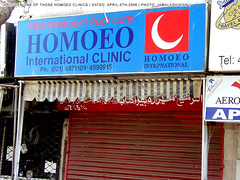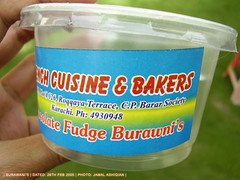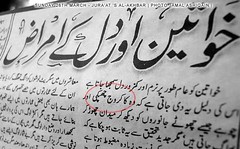Adil Najam
A couple of people have emailed to remind me that we have not had a post on Pinglish for a while. Maybe I got scared by sabizak’s reminder (here) that I should be more careful in my determination of what is or is not Pinglish. Must confess that I am still not sure what it is, even thought I offered a provisional definition of Pinglish (here); of course, this is very closely related to Hinglish. (More Pinglish posts here).
So, off I went in search of a better understanding of this thing I was calling Pinglish. What I found – hidden deep inside the crevasses of the Internet – was a delightful post on a forum called CyberMurid by someone going by the name bandali under the title ‘Pinglish, Urdish or Engdu.’ (Addition: Although I had originally found this material at the said website, we have since been informed that much of this material was part of an articel by Dr. Rauf Parikh in Dawn magazine, March 10, 2002.)
Here are the ‘techical essentials’:
A prominent feature of ‘Pinglish’ in the use of obsolete (in some cases even archaic) words and expressions. Local coinage is quite common. In some cases, this local coinage, though it may occasionally sound legitimate, would be incomprehensible or even hilarious to native ears. Sometimes, the local variety of the language sounds bookish (they ‘felicitate’, they don’t ‘congratulate’), too formal (‘do the needful’, for instance) or even ‘Un-English’. Many terms and phrases used in this part of the world are not part of the English language but have rather been ‘concocted’ and packed in a phrase-like expression. For example: pin-drop silence, cousin-brother, cutpiece and out of station (away from one’s home town). Grammatical liberties are quite interesting and pronunciation poles apart from what is known as RP (received pronunciation).
The writer goes on to give a hilarious list of examples. many of these are not ‘wrong,’ they are things that you will hear in Pakistan but those outside of our region may not understand them the way we do. Let me just share a few:
 ‘What is your good name’?
‘What is your good name’?
This may sound strange to the native ears since this is literal translation of ‘Ism-i-sharif’ in Urdu.
‘How is your good self?’
This also has a ring of Urdu. Perhaps ‘mizaj sharif’ translated.
Hotel:
It refers to an eatery as well as to any place meant for boarding and lodging. [ATP: Many of us still say ‘hotal meiN khana khana’ when we really mean restaurant].
Colony:
Forget colonialism and imperialism; in ‘Pinglish’ this refers to a large area comprising of residential blocks, for instance: Jinnah Colony, People’s Colony, Shah Faisal Colony, etc.
Cheater:
Used in colloquial Urdu (and local ‘English’, too) instead of ‘cheat’.
Bearer:
A waiter.
Affectee:
In desi English this means ‘someone affected,’ but it is not to be found in the dictionary (English dictionary, that is).
Cent percent:
Used instead of ‘a hundred per cent’ (‘per’ and ‘cent’ are put together).
Moot:
Used by some local newspapers instead of ‘meeting’.
Optical:
Used (especially by shops) in place of ‘eye glasses’.
Nullah:
Ravine; usually buses fall into ‘nullahs’ and ‘khuds’.
Dacoit:
A robber, perhaps from Urdu dakait.
Cutpiece:
A small, leftover piece of cloth; a local coinage. [ATP: See our ganderi discussion here and here].
Diggy:
The trunk of a car.
Black money:
Refers to money amassed through unfair means; another local usage, perhaps a literal translation of kala dhan
Toast:
A slice of bread whether toasted or not.
Kutcha:
Made of mud or clay, for example, a kutcha road, a kutcha house. Antonym is pucca.
Peon:
The dictionary says peon means a day-labourer; in India it meant a foot-soldier. But now, in Pakistan and India, it means ‘a messenger or office boy’.
 Eve-teasing:
Eve-teasing:
Sexual harassment.
Keep fast:
Instead of ‘fast’ (for roza); literal translation from Urdu.
Give exam:
Instead of ‘take exam’; literal translation from Urdu.
New, new things:
Literal translation from Urdu involving repetition of adjectives, such as ‘big, big cars’.
All of the original post if very well written and, importantly, is not trying to poke fingers at anyone:
This scribe is very much part of the mundane majority of Pakistanis that uses desi
At a more substantive level, bandali offers this useful and informative analysis:
Some linguists believe that a kind of ‘indigenization’ does occur when the speakers of other languages use a particular language and, according to them, when a language is used as a foreign language some ‘deviation’ may take place (because of the local milieu) and this ‘deviation’ should not be termed as a ‘mistake’. Rather, linguists like to refer to such versions as ‘regional variety’.
I do agree with this point of view, but in the case of desi English, they are not deviations or even mistakes; sometimes these are downright atrocities. I feel that if somebody wants to take revenge on the British for what they did to us during the British Raj, they should think of some other and better ways – for instance, ‘exporting’ some of our politicians to the UK for good (it will, in turn, benefit our country as well).
Some linguists, Dr Tariq Rehman, for instance, are of the view that Pakistani English is the new regional variety of the language and, therefore, should be viewed as such; i.e., something like South-Asian English or African English. This may be true, but in some instances, the ‘Urduization’ of English reaches such lengths that it sounds something like ‘Urdish’ or ‘Engdu’.
P.S. I have been unable to locate bandali and this writeup was originally posted on CyberMurid in March 2002; If someone knows who bandali is please convey to him (I assume it is ‘him’ from the name) that he has fans at ATP.
P.P.S. The photographs are from Jamsh; look at them carefully and enjoy. His photo collection is at Flickr.com and who blogs here. More Pinglish posts here.
P.P.P.S. Since having posted this, we have been informed that much of the material we had found on the CyberMurid website (now no longer functional) was part of an article by Dr. Rauf Parih in Dawn magazine (March 10, 2002).






















































This blog is getting matured gradually.
Could someone increase the font size of replies and comments.It is a bit strain on the eyes and secondly the option to edit comments before posting should be inserted.
Adil,
“What is your good name?” is much more common usage in India than in Pakistan because it is a more literal translation of “aap ka shubh naam?”. BTW, moot meaning meeting is literally correct and is middle english usage which we have probably retained long after the brits discarded it.
I could not figure out at your website how to become a member. Only place found to communicate was through this comment box. How can I submit an article for this site.
Ayesha
Happy Independence Day. read on
KARACHI, Aug 16: The Mazar of Quaid-i-Azam will remain closed to public for the second consecutive day, Thursday, owing to the widespread damage to its interior caused during a free-for-all on the occasion of the Independence Day.
Conducted tours for foreigners, which were scheduled for Wednesday, would also be organised on Thursday.
According to sources, the trouble on Tuesday evening had started following an incident of eve-teasing while the mausoleum was crowded with people paying homage to the Father of the Nation.
Some unruly youth indulged in eve-teasing and when girls raised a hue and cry, some sane people intervened to restrain the trouble-makers. However, the altercation between the two sides took the shape of free-for-all when people around joined in the quarrel, some on the youths’ side and some others on the others’. A fist-fighting ensued which later turned into a battle of bricks. During the battle, several doors of the Mazar, about 60 Bolard lights (along the walkways), more than 20 pole-mounted lights, 40 marble dust bins, 58 flower boxes at lower podium, over 700 running feet of decorative marble lattice, 40 garden benches, and many other things were damaged. The total loss has been estimated at Rs10 million.
Although, there were more than 600 policemen deployed at the Mazar on security duty but an most of them had already left in the morning after the VIP ceremony, attended by Governor Ishratul Ibad and Chief Minister Dr Arbab Ghulam Rahim, was over.
People were seen desperately seeking police held and it was after their hectic efforts that some police personnel were located and called in. They started a baton-charge to bring the situation under control.
The lawns between M. A. Jinnah Road and Shahrah-i-Quaideen also presented a look of a battle ground with bricks and stone, pieces of broken lights and benches, doors and glass pieces, etc., scattered all around.
Responding to the Dawn’s queries, the duty officer at the Brigade police station said that an FIR of the incident had been registered on the report of Mohammad Arif, Resident Engineer of the Quaid-i-Azam Mazar, against unknown persons. “No one has been arrested so far,â€
We prefer to think of it as improving the language rather than messing it up. Hey, with close to a billion speakers in south asia, english is more our language than it is the english’s.